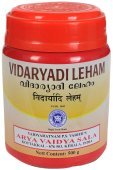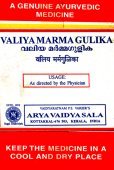Mudga: 25 definitions
Introduction:
Mudga means something in Hinduism, Sanskrit, Jainism, Prakrit, Marathi, biology. If you want to know the exact meaning, history, etymology or English translation of this term then check out the descriptions on this page. Add your comment or reference to a book if you want to contribute to this summary article.
Mudga has 24 English definitions available.
Languages of India and abroad
Sanskrit dictionary
[Deutsch Wörterbuch]
Source: Cologne Digital Sanskrit Dictionaries: Böhtlingk and Roth Grosses Petersburger WörterbuchMudga (मुद्ग):—[Uṇādisūtra 1, 127.] m.
1) Phaseolus Mungo Lin. (die Pflanze und die Bohnen) [Yāska’s Nirukta 9, 24.] [Pāṇini’s acht Bücher 4, 3, 166, Vārttika von Kātyāyana. 1,] [Scholiast] [Trikāṇḍaśeṣa 2, 9, 2.] [Hemacandra’s Abhidhānacintāmaṇi 1172.] [Halāyudha 2, 7.] [Vājasaneyisaṃhitā 18, 12.] mudgaudana [Śāṅkhāyana’s Gṛhyasūtrāṇi 1, 22.] [Pāraskara’s Gṛhyasūtrāṇi 1, 15.] [Manu’s Gesetzbuch 9, 39.] [Harivaṃśa 16205.] [Suśruta 1, 53, 1. 79, 21. 149, 12. 157, 21. 197, 13. 17.] [Varāhamihira’s Bṛhajjātaka S. 5, 75. 15, 14. 25, 2. 29, 5. 55, 16.] mudgābha die Farbe der Mudga-Bohnen habend [53, 123. 54, 107.] mudgā api hi ṣaṣṭirātreṇa pacyante [Pāṇini’s acht Bücher 5, 1, 90, Vārttika von Kātyāyana.,] [Scholiast] [Weber’s Verzeichniss No. 987.] [Dhūrtasamāgama] in [Lassen’s Anthologie 79, 15.] [Scholiast] zu [Kātyāyana’s Śrautasūtrāṇi 102, 8. 176, 4. 648, 7.] Vgl. araṇya, kṛṣṇa, pīta, vana. āraṇyamudgā, kāka, vana, maudga, maudgika, maudgīna . —
2) a cover, as a lid or cloth [WILSON.] —
3) Seerabe [Śabdakalpadruma] nach [Hemacandra’s Abhidhānacintāmaṇi]; falsche Lesart für madgu (vgl. [Hemacandra’s Abhidhānacintāmaṇi 1323]).
Source: Cologne Digital Sanskrit Dictionaries: Sanskrit-Wörterbuch in kürzerer FassungMudga (मुद्ग):—m. —
1) Phaseolus Mungo , die Pflanze und die Bohne [Rājan 16,37.] —
2) a cover , as a lid or cloth , —
3) Seerabe ; richtig madru.
Sanskrit, also spelled संस्कृतम् (saṃskṛtam), is an ancient language of India commonly seen as the grandmother of the Indo-European language family (even English!). Closely allied with Prakrit and Pali, Sanskrit is more exhaustive in both grammar and terms and has the most extensive collection of literature in the world, greatly surpassing its sister-languages Greek and Latin.
See also (Relevant definitions)
Starts with (+33): Mudagade, Mudgabada, Mudgabha, Mudgabhojin, Mudgabhuj, Mudgacurna, Mudgadala, Mudgadi, Mudgagiri, Mudgah, Mudgala, Mudgala bhatta, Mudgala bhatta hosinga, Mudgala suri, Mudgala vaidya pandita, Mudgaladeva, Mudgalani, Mudgalapurana, Mudgalarshi, Mudgalarya.
Ends with: Anjanamudga, Aranyamudga, Ardhasamudga, Arkasamudga, Banmudga, Harimudga, Hemamudga, Kakamudga, Kankamudga, Krishnamudga, Mahattaramudga, Pitamudga, Rajamudga, Samudga, Shvetamudga, Snigdhamudga, Vallimudga, Vanamudga.
Full-text (+129): Mudgaparni, Krishnamudga, Pitamudga, Vanamudga, Mudgabhuj, Mudgabhojin, Mudgamodaka, Rajamudga, Pancasasya, Mudgagiri, Mudgaudana, Supashreshtha, Mudgardrakavata, Harimudga, Bhuktiprada, Kakamudga, Maudgina, Mudgavat, Mudgayusha, Samudga.
Relevant text
Search found 44 books and stories containing Mudga; (plurals include: Mudgas). You can also click to the full overview containing English textual excerpts. Below are direct links for the most relevant articles:
Sushruta Samhita, Volume 6: Uttara-tantra (by Kaviraj Kunja Lal Bhishagratna)
Chapter XXXIV - Treatment of an attack by Shita-putana < [Canto II - Kaumarabhritya-tantra (pediatrics, gynecology and pregnancy)]
Chapter XLIX - Symptoms and Treatment of Vomiting (Chardi) < [Canto III - Kaya-chikitsa-tantra (internal medicine)]
Chapter V - Pathology of the diseases of the black part of the eye < [Canto I - Shalakya-tantra (ears, eyes, nose, mouth and throat)]
Manusmriti with the Commentary of Medhatithi (by Ganganatha Jha)
Verse 3.266 < [Section XXI - Relative Merits of the Offering-Materials]
Verse 9.40 < [Section III - To whom does the Child belong?]
Verse 9.49 < [Section III - To whom does the Child belong?]
Rasa Jala Nidhi, vol 4: Iatrochemistry (by Bhudeb Mookerjee)
Part 9 - Diet in nava-jvara < [Chapter II - Fever (jvara)]
Part 26 - Diet and actions in udara-roga < [Chapter VI - Diseases affecting the belly (udara-roga)]
Part 8 - Treatment of Udara-roga (5): Jalodara-hara rasa < [Chapter VI - Diseases affecting the belly (udara-roga)]
Chaitanya Bhagavata (by Bhumipati Dāsa)
Verse 3.4.467 < [Chapter 4 - Descriptions of Śrī Acyutānanda’s Pastimes and the Worship of Śrī Mādhavendra]
Verse 2.9.85 < [Chapter 9 - The Lord’s Twenty-One Hour Ecstasy and Descriptions of Śrīdhara and Other Devotees’ Characteristics]
Verse 2.5.14 < [Chapter 5 - Lord Nityānanda’s Vyāsa-pūjā Ceremony and His Darśana of the Lord’s Six-armed Form]
The Markandeya Purana (Study) (by Chandamita Bhattacharya)
Foods and Oṣadhīs Used in Sacrificess (Yajñiya) < [Chapter 2]
Used and Prohibited Food and Vegetables for Śrāddha Ceremony < [Chapter 2]
Rasa Jala Nidhi, vol 5: Treatment of various afflictions (by Bhudeb Mookerjee)
Related products
(+1 more products available)





